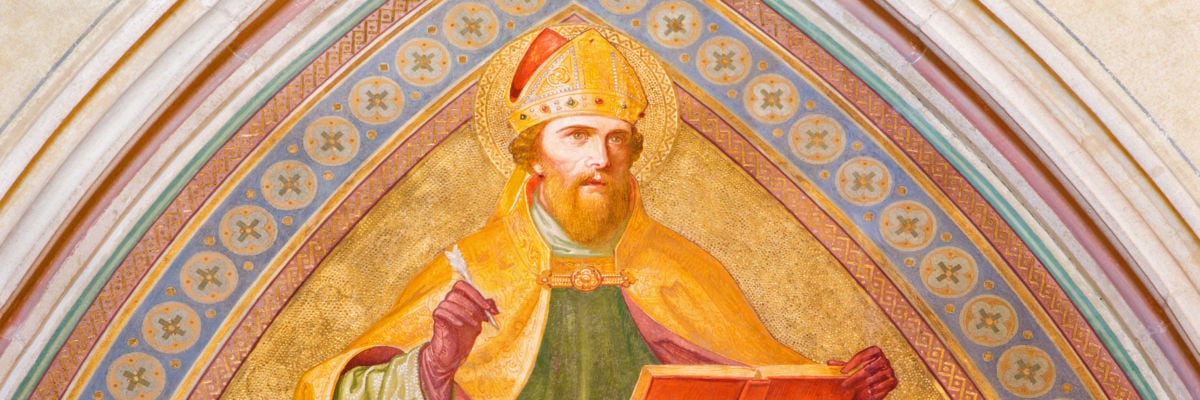
Question:
Answer:
St. Augustine of Hippo taught neither doctrine. He did not teach “double predestination,” i.e., that not only does God predestine some to heaven, he also ordains that others will go to hell so that there is nothing they can do to reverse their eternal damnation.
To be clear, John Calvin taught this erroneous doctrine, not Martin Luther. Among other problems, there is no free will of any consequence for those who are divinely reprobated. In other words, they will ultimately be damned and can’t do a thing about it. Augustine would have strongly disagreed with this heresy, as he affirmed man’s God-given free will and thus our ability to accept or reject God’s free gift of eternal salvation.
The Catholic understanding of predestination or divine election encompasses man’s free-will response in accepting God’s gift of eternal salvation. As Augustine, the great Father and Doctor of the Church, summarized so well, “God created us without us: but he did not will to save us without us” (CCC 1847).
St. Augustine would also affirm that God knows from all eternity who will accept his gift of salvation and who will reject it. That’s because God is omnipotent (all-powerful) and omniscient (all-knowing), so nothing he creates—including the material realms of time and space—can limit him. Rather, to God, everything is present. He doesn’t have to wait for history to unfold as we mere humans do to find out what is going to happen. Otherwise, he wouldn’t be God.
On the other hand, God’s knowing how we will choose does not entail his willfully predetermining how we will choose. Here we see the worst part of Calvin’s “dreadful doctrine,” as he describes this teaching: it’s blasphemous. God, who is supposed to be all good, is ultimately responsible for those who go to hell, not the sinners themselves. A mere human mother desires that all of her children be saved. How much then would we expect from a divine creator?
Indeed, Scripture affirms that God desires the salvation of all mankind (1 Tim. 2:4, 2 Pet. 3:9), and that those who go to hell choose to exclude themselves from him and his heavenly kingdom (see, e.g., Matt. 7:13-14, 25:31-46; CCC 1033-37).
These passages from Matthew affirm that man is not saved by God’s grace through faith alone, contrary to what Martin Luther taught, but through both faith and good works (see also James 2:14-26). As a faithful Catholic bishop, which is beyond dispute, St. Augustine concurred with Jesus and St. James.
For more on predestination, see this article by Jimmy Akin, which illustrates that the Church permits varying yet complementary perspectives. See also Tim Staples’ articles here and also here and here, which address Calvin’s doctrine of double predestination and the importance of our free response to Christ’s free gift of eternal salvation. See also mine. See also CCC 1854-1864; 2006-2016.
Further, it’s important to read St. Augustine in light of the faithful Catholic bishop he undoubtedly was. When read in isolation, some of St. Augustine’s writings might seem to teach Calvinist predestination, similar to how one might infer Arianism from isolated passages of Scripture.
Further, it’s important to read St. Augustine in light of the faithful Catholic bishop he undoubtedly was. When read in isolation, some of St. Augustine’s writings might seem to teach Calvinist predestination, similar to how one might infer Arianism from isolated passages of Scripture.
However, long before the Arminians who rebelled against Calvin existed, the Catholic Church has always taught we have a genuine free will by which we can accept or reject our Lord Jesus Christ’s free gift of eternal salvation; and the Church teaches this doctrine precisely because our Lord Jesus himself taught the same (e.g., Matt. 7:21-23; 19:16-26, 25:31-46), and continues to teach the same through his Church (John 16:13; Acts 2:42).
So too St. Augustine taught we have a genuine free will, and thus we can accept or reject our Lord Jesus’ free gift of salvation. As a faithful Catholic bishop, St. Augustine believed that our Lord Jesus Christ founded one Catholic Church, a Church which he has sustained ever since, just as our Lord Jesus promised (Matt. 16:18-19).



